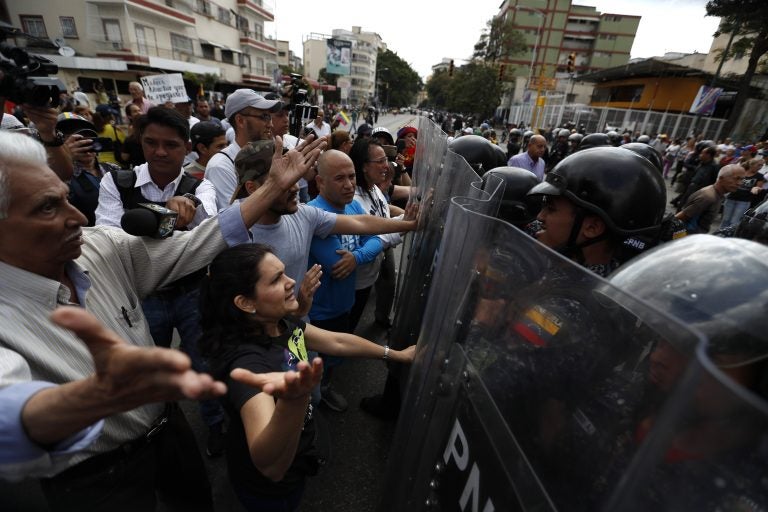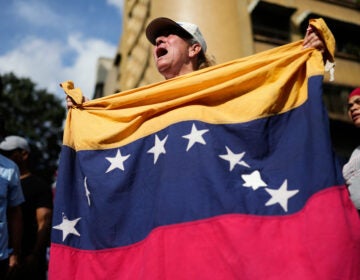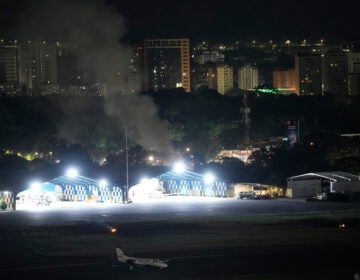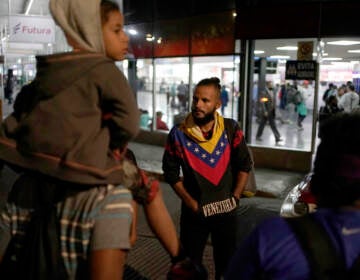More blackouts hit Venezuela as opposition, government rally
Tensions were only compounded further by a new power shutdown that came just hours after an earlier blackout in the country appeared to be easing.

Venezuelan police block a crowd of people who gather to march against the government of President Nicolas Maduro, in Caracas, Venezuela, Saturday, March 9, 2019. Security forces are deploying in large numbers in Caracas ahead of the planned demonstrations by supporters of opposition leader Juan Guaido. (Eduardo Verdugo/AP Photo)
Venezuelan opposition protesters on Saturday converged on a main avenue in Caracas and other parts of the country, venting their anger over a nationwide blackout, shortages of basic necessities and the government of President Nicolas Maduro.
At the same time, supporters of Maduro held a rival demonstration in a separate district of the Venezuelan capital that drew a mass of people protesting against the U.S. and its “brutal aggression” against the South American country.
Both rallies illustrated the ever-growing gulf between two factions now struggling for control of a nation paralyzed by economic and political turmoil.
Meanwhile, tensions were only compounded further by a new power shutdown that came just hours after an earlier blackout in the country appeared to be easing.
“This is chaos,” said Jorge Jaimes, a physician who joined opposition protesters on Avenida Victoria in Caracas. “We are at the end of this road.”
Opposition demonstrators earlier in the morning pushed against the shields of riot police, who withdrew from the area but maintained a large presence. Some protesters elsewhere in the city said lines of police were blocking them from reaching the rally organized by opposition leader Juan Guaido, creating a sense of confusion as power and communications outages plagued the country.
Netblocks, a non-government group based in Europe that monitors internet censorship, said Saturday a second outage had knocked out almost all of Venezuela’s telecommunications infrastructure.
Earlier, it referred to online connectivity data indicating that the initial outage that began Thursday and eased about 24 hours later was the largest on recent record in Latin America.
Managers of the Caracas subway said they were still waiting for the electricity supply to stabilize before resuming service, but the power grid problems quickly became another issue that galvanized Venezuelans to take to the streets.
As the opposition-led rally got underway, police units and members of the National Guard were deployed at several intersections, wearing helmets and carrying shields and other anti-riot gear. Several columns of security forces moved on motorcycles.
Opposition activists said police had dismantled a speakers’ stage that had been erected in the street ahead of the demonstration on Saturday, while Guaido tweeted that authorities would fail in any attempt to scare protesters.
“Today we’ll show them in the streets,” he said.
Meanwhile, demonstrators at the pro-Maduro rally danced and waved flags on what organizers labeled a “day of anti-imperialism” in a show of defiance toward the United States, which has imposed oil sanctions on Venezuela in an attempt to oust the president. Many showed up wearing red caps and shirts in support of the self-proclaimed “socialist revolution” of leader Hugo Chavez, who died six years ago and was succeeded by his protege, Maduro.
Maduro, who maintains that Guaido is part of a U.S.-backed plot to oust him, tweeted Saturday that “each act of imperialist aggression will meet an overwhelming response.”
In the last two days, Venezuelan government officials have blamed the United States for the nationwide blackout and said that Guaido collaborated in the alleged sabotage.
Guaido and U.S. officials scoff at the notion, attributing the blackout to alleged corruption and mismanagement under Maduro’s government.
The United States and about 50 other countries support Guaido, 35, who has been unable to wrest power from Maduro.
Guaido, the leader of Venezuela’s National Assembly, declared himself interim president of the country in late January.
___
Associated Press journalist Scott Smith contributed to this report.
WHYY is your source for fact-based, in-depth journalism and information. As a nonprofit organization, we rely on financial support from readers like you. Please give today.




